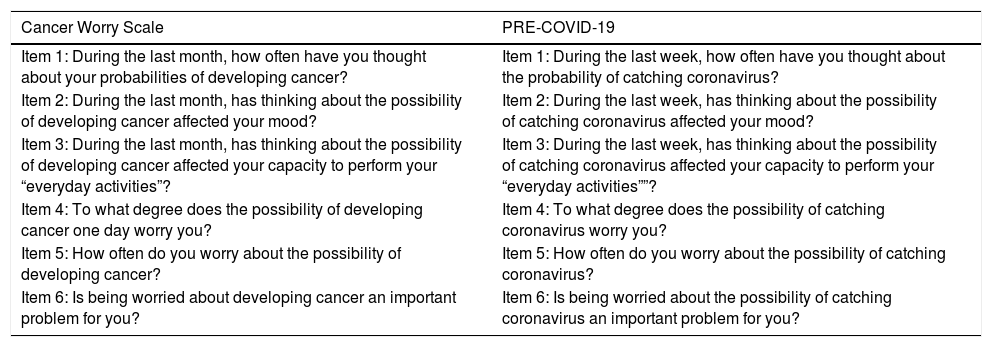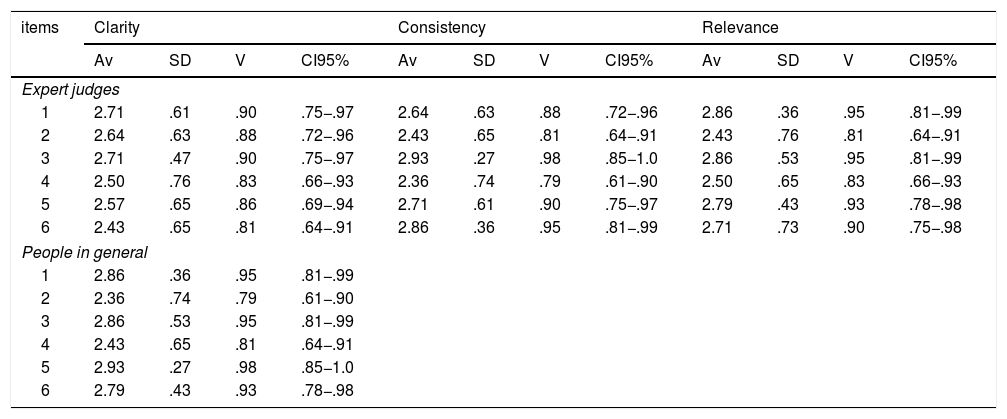The increase in COVID-19 cases is generating fear and concern in society, which generates an emotional response that influences the adoption of health-related behaviors. The objective of the study was to design and validate the Scale of Worry for Contagion of COVID-19 (PRE-COVID-19).
MethodThe study had a descriptive cross-sectional design. The population were young people and adults who resided in the cities of Lima and Callao during the declaration of the national health emergency due to the COVID-19 pandemic. 816 young people and adults from Lima and Callao (200 men and 616 women, Medad = 28.40; SD age = 7.10) participated during the period from March 16 to 27, 2020, who were recruited through a non-probability sample. The PRE-COVID-19, the WHO-Five Well-Being Index, the Generalized Anxiety Disorder Scale-2 and a single item were applied to measure the general perception of health. The scales were shared using a Google form through social networks. An internal consistency reliability analysis and structural equation models were performed, specifically confirmatory factor analysis (AFC). The recommendations of the Declaration of Helsinki and the principles that guide the ethical practice of online studies were followed.
ResultsThe results show a one-dimensional model with satisfactory goodness-of-fit indices (χ2 (9) = 52.00; CFI = .99; RMSEA = .09 [.07, .12]; WRMR = .85). The λ of the model were higher than 0.50 and the reliability had an excellent value (ω = .90). Likewise, the convergent and discriminant validity is evident between PRE-COVID-19 and measures of anxiety, well-being and self-reported health.
ConclusionThe results indicate that the PRE-COVID-19 is a valid and reliable instrument to measure concern about the spread of COVID-19 and the emotional impact on people.
El incremento de los casos de la COVID-19 está generando miedo y preocupación en la sociedad, lo que genera una respuesta emocional que influye en la adopción de comportamientos relacionados con la salud. El objetivo del estudio fue diseñar y validar la Escala de Preocupación por el Contagio de la COVID-19 (PRE-COVID-19).
MétodoEl estudio tiene diseño descriptivo transversal. La población han sido jóvenes y adultos residentes en las ciudades de Lima y Callao durante la declaración de la emergencia sanitaria nacional por la pandemia del COVID-19 durante el periodo del 16 al 27 de marzo de 2020 quienes fueron reclutados a través de un muestreo no probabilístico. Se aplicaron la PRE-COVID-19, la WHO-Five Well-Being Index, Generalized Anxiety Disorder Scale-2 y un ítem único para medir la percepción general de salud. Las escalas fueron compartidas mediante un formulario de Google a través de redes sociales. Se realizó un análisis de fiabilidad por consistencia interna y modelos de ecuaciones estructurales, específicamente el análisis factorial confirmatorio (AFC). Se siguieron las recomendaciones de la Declaración de Helsinki y los principios que guían la práctica ética de los estudios vía online.
ResultadosParticiparon 816 jóvenes y adultos de Lima y Callao (200 varones y 616 mujeres, Medad = 28.40; DEedad = 7.10). Los resultados muestran un modelo unidimensional con índices de bondad de ajuste satisfactorios (χ2 (9) = 52.00; CFI = .99; RMSEA = .09 [.07, .12]; WRMR = .85). Las λ del modelo fueron superiores a 0.50 y la fiabilidad tuvo un valor excelente (ω = .90). Asimismo, se evidencia la validez convergente y discriminante entre la PRE-COVID-19 y medidas de ansiedad, bienestar y salud autoinformada.
ConclusiónLos resultados indican que la PRE-COVID-19 es un instrumento válido y fiable para medir la preocupación por el contagio de la COVID-19 y el impacto emocional en las personas.












